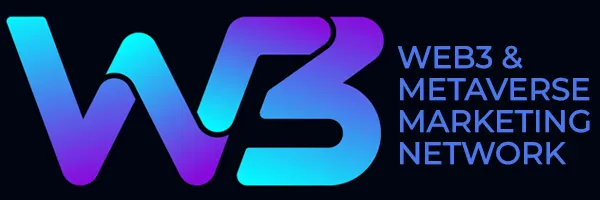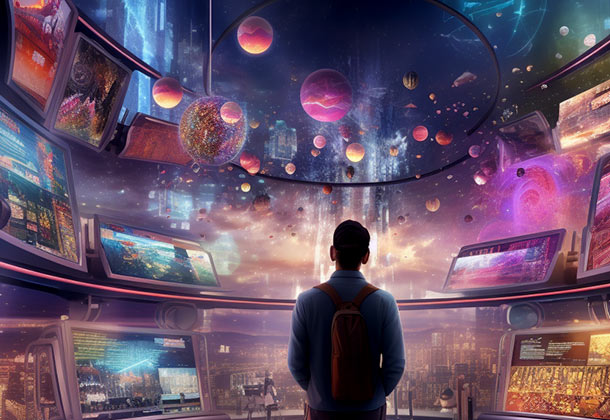Ever contemplated the vast expanse beyond your screen, where the tangible world intersects with the digital realm? Welcome to the metaverse, an intriguing space that’s currently reshaping the foundations of marketing. Have you heard about Metaverse Marketing, where from virtual billboards to user-generated content, a unique opportunity unfolds to connect with audiences? In this blog, we embark on a deep dive into the metaverse, exploring its potential and uncovering how it’s revolutionizing the landscape of marketing.
Unveiling the Metaverse: The term “Metaverse” was first coined by Neal Stephenson in his 1992 science fiction novel, Snow Crash. As described by Mathew Ball, a private investor and venture capitalist, the Metaverse is essentially the 3D iteration of the Internet and computing. In simpler terms, it’s a digital realm mirroring the real world, where individuals lead digital lives, each with a personalized avatar. In this space, socializing, attending events, trading assets, and more become immersive experiences.
Understanding the Evolution (History of Metaverse): Originating from Stevenson’s dystopian novel, the concept of the Metaverse has evolved over the years. The term “Cyberspace,” introduced in 1982, hinted at a virtual computer world primarily for communication via computer networks. Gaming, with pioneers like Second Life and Roblox, significantly contributed to shaping the history of the Metaverse.
Marketing in the Metaverse: As technology propels us into a virtual era, the Metaverse emerges as a unique 3D internet model dominating the digital landscape. It provides a digital platform continuously expanding, enabling users to grow based on decisions and connections within the space. Marketers are quick to recognize the potential, aligning strategies with the understanding that the Metaverse is the next big phenomenon in the digital realm. Millennials and GenZers, being avid users of technologies like VR and platforms like Roblox, become crucial target audiences.
The Future of Marketing in the Metaverse: Parallel Metaverse Marketing Within Real-life Marketing: Entering the virtual avatar realm, Metaverse marketing seamlessly integrates real-life strategies into the digital world. While advantageous in reducing supply chain costs and engaging users, it requires careful planning and substantial marketing efforts.
Immersive Experience As A Solution: Metaverse marketing introduces virtual billboards and immersive advertisements, offering experiential engagements. Virtual advertising, especially through platforms like Roblox, opens new avenues for brands to connect with audiences.
Collectibles Are Offered: In the Metaverse, the allure of collectibles extends to branded assets and limited edition items, contributing to the significance of the space. Brands can leverage this by offering unique items, creating value for users.
Engaging With Existing Communities: Respecting existing communities is essential in the Metaverse, where advertisements might not always be welcomed. Engaging with these communities and incorporating user-generated content becomes crucial for successful marketing campaigns.
Continuous Experimentation: Metaverse marketing is a novel concept, offering ample room for experimentation. With best practices yet to be established, marketers have the opportunity for unique and creative approaches.
Metaverse Boosts Effortless Introduction: Metaverse development opens avenues for effortless interactions between online and offline worlds, providing unique opportunities for marketing efforts, including sampling, trials, and creative presentations.
Metaverse Promotes Buying Experience: Enhancing the online buying experience becomes a focus in the Metaverse, where users can virtually visit brand outlets, select avatars, and shop without leaving their homes.
Metaverse Will Accelerate the Adoption of Digital Money: Crypto, digital tokens, and NFTs find a home in the Metaverse, potentially accelerating the adoption of digital currencies.
How Can SurveySparrow Help? As businesses gear up for metaverse marketing, tools like SurveySparrow play a crucial role. Real-time feedback and insights from the Metaverse audience can be collected to tailor marketing strategies effectively. SurveySparrow offers tools for creating immersive surveys, engaging with virtual audiences, and gaining actionable insights.
Examples of Metaverse: Examples such as Second Life and Roblox provide insights into how brands can leverage the Metaverse. These platforms, with millions of users, showcase the potential for immersive experiences and user engagement.
So What Could Be Next for Marketing and the Metaverse? Combined Reality And Virtual Conferences And Conventions: The Metaverse presents opportunities for businesses to conduct virtual conferences, saving time and resources. Bands and artists can host virtual shows globally.
Targeting Gen Z And Millennials: Targeting these tech-savvy generations becomes crucial, as they view digital lives as essential as physical ones.
A More in-depth Level Of Customer Loyalty: The Metaverse operates in a 24/7 loop, requiring real-time strategies for customer loyalty.
Challenges in the Metaverse: Despite its potential, the Metaverse faces challenges, including hardware limitations, identity authentication, and concerns related to dependence, mental well-being, data privacy, legal aspects, jurisdiction, and digital payments.
Conclusion: The Metaverse is on the brink of becoming a reality, transforming our real world into a more virtual experience. Virtual reality and Metaverse marketing will evolve, offering unique opportunities for immersive brand experiences. As this nascent space develops, businesses need to be adaptable, focusing on customer engagement, loyalty, and a reliable Metaverse.
The Future Is in the Metaverse: The future of the Metaverse is shaped by standardization, market fragmentation, user interface, and governance. Decision-makers should not underestimate its potential, consider long-term strategies, focus on user needs, and commit to a reliable Metaverse. Despite challenges, the Metaverse holds enormous opportunities for businesses willing to embrace this evolving technology.
In conclusion, the Metaverse is not just a dream; it’s becoming a reality that will redefine our experiences. Developers and innovators are working tirelessly to turn this virtual world into a wonderful reality.










